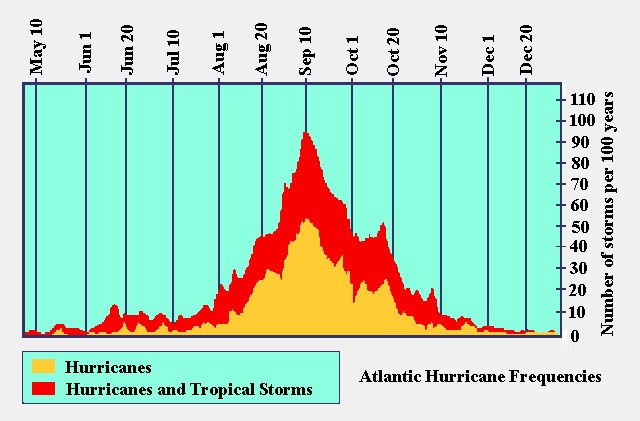Welcome to DU!
The truly grassroots left-of-center political community where regular people, not algorithms, drive the discussions and set the standards.
Join the community:
Create a free account
Support DU (and get rid of ads!):
Become a Star Member
Latest Breaking News
General Discussion
The DU Lounge
All Forums
Issue Forums
Culture Forums
Alliance Forums
Region Forums
Support Forums
Help & Search
General Discussion
Related: Editorials & Other Articles, Issue Forums, Alliance Forums, Region ForumsHurricanes and Climate Change: Huge Dangers, Huge Unknowns-Jeff Masters
http://www.wunderground.com/blog/JeffMasters/comment.html?entrynum=2481<snip>
Hurricane Sandy's enormous $65 billion price tag put that great storm in third place for the most expensive weather-related disaster in U.S. (and world) history. Indeed, when we look at the list of most expensive U.S. weather-related disasters since 1980, hurricanes dominate, claiming six of the top ten spots. Drought is also a formidable presence, accounting for three of the other top-ten budget-busting disasters. Thus, a critical question for society is: how will our dangerous uncontrolled experiment of dumping massive amounts of heat-trapping carbon dioxide into the air affect droughts and hurricanes? For droughts, the answer is relatively straightforward--in general, dry parts of the world like the Southwest U.S. and Southern Europe are predicted to get drier. The worst droughts will get more extreme, wherever they occur, since it will be hotter. But for hurricanes, the uncertainties are greater. Since hurricanes are heat engines that extract heat energy from the oceans to power themselves, hurricane scientists are confident that the very strongest storms will get stronger by the end of the century, when Earth's land and ocean temperatures are expected to warm to levels unmatched since the Eemian Era, 115,000 years ago. Computer modelling work consistently indicates that greenhouse warming will cause the globally averaged intensity of tropical cyclones to shift towards stronger storms, with intensity increases of 2–11% by 2100. But hurricanes are fussy creations, and are sensitive to wind shear and dry air. Although the strongest storms should get stronger when "perfect storm" conditions are present, these "perfect storm" conditions may become less frequent in the future, due to the presence of higher wind shear and/or more dry air. Indeed, the climate models used to formulate the 2007 IPCC report suggested that we might see the strongest hurricanes getting stronger, but a decrease in the total number of hurricanes in the Atlantic (and worldwide) later this century. However, the latest set of models used to formulate the 2013 IPCC report, due out in September, show that the total number of hurricanes both globally and in the Atlantic may increase in both number and intensity, according to a paper published in July 2013 by one of our top hurricane scientists, Dr. Kerry Emanuel of MIT. Hurricane intensity may also increase, leading to a global increase of 40% of Category 3 and stronger hurricanes by 2100. However, the uncertainties in this research are great. We really don't know how global warming will affect the number of hurricanes and their intensity.
It is essential that we limit coastal development in vulnerable coastal areas, particularly along barrier islands, to reduce some of the astronomical price tags hurricanes are going to be causing in the future. Adoption and enforcement of strict building standards is also a must, as well as more reforms to the government's National Flood Insurance Program (NFIP), which subsidizes development in high-risk coastal regions that private insurers won't touch. NFIP is now $25 - 30 billion in the red, thanks to Hurricane Katrina and Hurricane Sandy. Reform of NFIP is already underway. In 2012, before Sandy hit, Congress passed the Biggert-Waters Flood Insurance Reform Act, which requires people with NFIP policies to pay large premium increases of about 25% per year over the next five years. Naturally, this move has caused major controversy.
InfoView thread info, including edit history
TrashPut this thread in your Trash Can (My DU » Trash Can)
BookmarkAdd this thread to your Bookmarks (My DU » Bookmarks)
4 replies, 1349 views
ShareGet links to this post and/or share on social media
AlertAlert this post for a rule violation
PowersThere are no powers you can use on this post
EditCannot edit other people's posts
ReplyReply to this post
EditCannot edit other people's posts
Rec (2)
ReplyReply to this post
4 replies
 = new reply since forum marked as read
Highlight:
NoneDon't highlight anything
5 newestHighlight 5 most recent replies
= new reply since forum marked as read
Highlight:
NoneDon't highlight anything
5 newestHighlight 5 most recent replies
Hurricanes and Climate Change: Huge Dangers, Huge Unknowns-Jeff Masters (Original Post)
malaise
Aug 2013
OP
deutsey
(20,166 posts)1. I'm beginning to think where I can re-locate inland
I'm on the Delmarva Peninsula in Maryland and Sandy was projected to make a direct hit on us last year.
With reports like this, I don't know how long we'll be able to dodge that bullet.
malaise
(268,998 posts)2. Sandy was beyond frightening but then add Irene to that
mix and it gets worse.
deutsey
(20,166 posts)3. I know...I made it through both
I'm really not looking forward to the next few months...that's when both storms came through, end of August one year and end of October the next.
malaise
(268,998 posts)4. There's nothing like peak season
